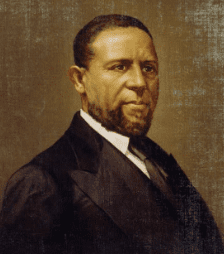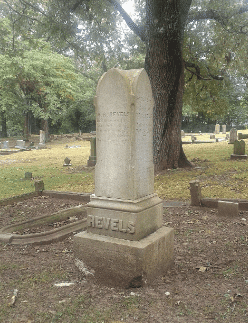This article first appeared on the Magnolia Tribune.
- Revels fought for equality early and often in his short tenure in the United States Senate but did so from a position of mercy and grace.
Hiram Rhodes Revels is most commonly known as the first black man to serve in the United States Congress. Revels was elected to the U.S. Senate by the Mississippi Legislature in 1870 and 1871, during the Reconstruction Era.
While his nomination to the United States Senate was wildly supported by his community in Adams County and the state legislature, it would be hotly contested once he approached his seat in the U.S. Congress.
Revels lived all over the South throughout his childhood and as a young adult. Revels was born in Fayetteville, North Carolina, September 27, 1827. The Revels family was a free family—they were not enslaved and hadn’t been since before the Revolutionary War.
When Revels was just eleven years old, he went to live with an older brother in Lincolnton, North Carolina, where he studied to be a barber in his brother’s shop. Three years later, his brother died, and when his brother’s widowed wife was set to remarry, she transferred ownership of the barbershop to Revels.
Revels in Ministry and Military

From there, Revels felt a calling into Christian ministry. After attending seminary in Indiana, Revels was ordained into pastorship within the African Methodist Episcopal Church in 1845. As many pastors do, Revels answered the call to preach in many churches across the Midwest. He was actually imprisoned for preaching to black people in Missouri in 1854. Following that imprisonment, Revels went back to school to study religion at Knox College in Illinois. After that, he moved to Baltimore, Maryland to pastor a church and serve as the principal for the local high school.
When the Civil War broke out in 1861, just four years after Revels began preaching and educating in Baltimore, he joined the Union Army, and organized one of the first troops of black soldiers. He also organized two black units for the Army and fought at the Battle of Vicksburg in 1863.
When the war ended in 1865, Revels left the AME church for the Methodist Episcopal Church. A year later, he was called to a permanent pastor position in Natchez, Mississippi. For the next few years, he took a state administration position within the Methodist Episcopal Church, founded schools for black children, and served as a city alderman.
Revels’ Road to Congress
In an almost biblical fashion, Revels, who was fairly new to Natchez, was elected in1868 by the Adams County community to serve in the Mississippi State Senate, after just one year of being an alderman. Hardly two years passed before the Mississippi State Legislature voted him into the United States Congress with very little opposition, as the final vote was 85 yays and 15 nays.
While his election by the Mississippi Legislature seemed to go smoothly, the fight for Revels’ well-earned seat was complicated by the United States Senate. In 1870, the Democrats fought against Revels’ confirmation, citing the Dred Scott Decision from the U.S. Supreme Court: African Americans were not considered United States citizens, and therefore could not serve in Congress. Though this was ratified under the 14th Amendment in 1868, the wording of that decision was that a citizen (anyone “born into the United States,”) could run for Congress, but Democrats argued that Revels was clearly born before the 14th amendment was enacted and therefore wasn’t eligible for the position.
However, Revels was not fully African American. Revels’ ancestors hailed from all over, with ancestry from Africans, Europeans, Native Americans, and the Scottish.
That melting pot of DNA came in handy for Revels—since the old law stated specifically those of African descent could not be citizens and therefore could not be elected to Congress, Revels was confirmed to the seat, as he was not fully African American. That is how Revels became the first black man to be elected to the United States Congress.
The Fight for Equality
Revels fought for equality early and often in his short tenure in the United States Senate but did so from a position of mercy and grace. While those on the more extreme end on his Republican side of the aisle wanted to continue to punish those who fought for the Confederate Army, Revels suggested reinstating their American citizenship with no more punishment, provided they vow loyalty to the United States.
Unfortunately, many of Revels’ attempts toward racial equality did not come to pass, at least not by his hand. Integration efforts he supported failed. A young black man he vouched for in order to be admitted into the U.S. Military Academy was denied entry. Revels did, however, successfully campaign for black workers to be employed at the Washington Navy Yard, as they were originally barred on account of their race.

After serving in the United States Congress, Revels returned to Mississippi. He became the first black president of Alcorn University, an HBCU in Claiborne County. While there, he was also Secretary of State; however, when he rallied against the re-election of then Governor Alderbert Ames, he was fired from Alcorn in 1874. In 1876, Ames was impeached, and Revels was reinstated at Alcorn until 1882, when he retired.
After retirement, Revels returned to full-time ministry and served at a Methodist Episcopalian church in Holly Springs, Mississippi. He also served at Shaw College, which is now Rust College. He died while attending a church conference in 1901 and is buried in Holly Springs at Hillcrest Cemetery.
The Mississippi State Legislature honored and forever memorialized H.R. Revels with a resolution in 2020. It read:
WHEREAS, it is the policy of the House of Representatives to appreciate our past so we can better define our future and to pay homage to an individual of Senator Revels’ caliber, who served as a trailblazing pioneer, and whose contributions merit honor and respect:
NOW, THEREFORE, BE IT RESOLVED BY THE HOUSE OF REPRESENTATIVES OF THE STATE OF MISSISSIPPI,
That we do hereby celebrate the historic life and legacy of the Honorable Hiram Rhodes Revels as the first African American to serve in Congress as a United States Senator.BE IT FURTHER RESOLVED,
That copies of this resolution be furnished to the descendants of Hiram Rhodes Revels and to the members of the Capitol Press Corps.
This article first appeared on the Magnolia Tribune and is republished here under a Creative Commons license.
Read original article by clicking here.

